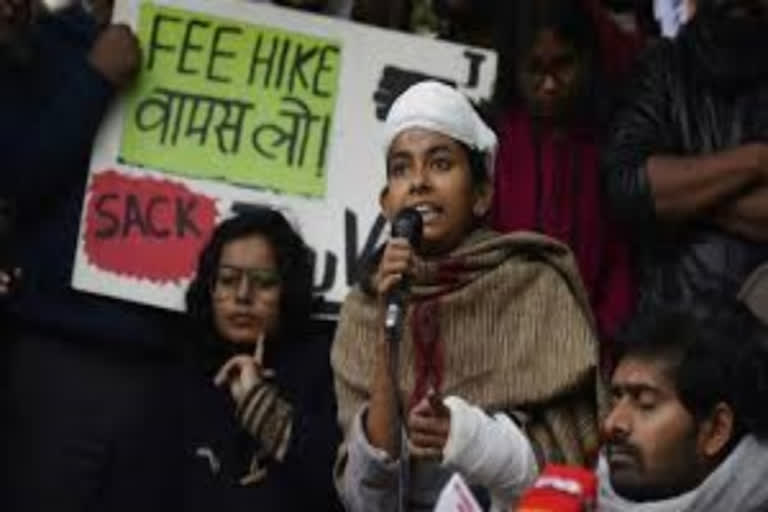New Delhi: The rate of Jawaharlal Nehru University’s decline has been precipitous. A university known to have successfully kept large-scale student violence at bay, that was able to maintain decently high academic standards, whose students’ union election was widely admired, became the site of grisly violence on the evening of January 5, 2020. It was accompanied by terrifying blood-curdling screams, captured on camera and shown by media networks across the country and the world.
These shocking incidents are contributing to the larger galvanization of an ongoing movement against the Modi government’s unpopular decisions. The fact that celebrities from Bollywood have expressed their solidarity with JNU, notably Deepika Padukone who actually went to the campus and met injured JNU Student's Union President Aishe Ghosh, would normally rattle most governments, but this government shows no sign of backtracking.
Observers have been quick to note the alacrity and ferocity of the police response in the Jamia violence that took place just three weeks ago, while in JNU there was an almost foot-dragging reluctance on display. Note the contrast between the students of Jamia who were made to leave their university campus with hands in the air, while the masked outsiders in the JNU violence were allowed to leave the campus, scot-free.
The current dispensation certainly has a bee in its bonnet when it comes to JNU.
Yogendra Yadav of Swaraj Abhiyan, who was roughed up outside the university campus when the violence was going on inside, has suggested that there have been intellectual attacks on JNU, followed by political attacks such as the sedition issue in which the university was systematically demonized. It has now escalated to the level of outright physical violence.
The initial attacks usually came in the form of smooth-talking English-speaking intellectuals associated with the BJP such as Swapan Dasgupta and Chandan Mitra, while he was still with the party.
The usual complaint has been that leftists in JNU have never allowed intellectuals of the right to enter and flourish.
Let us for a minute accept that this argument has some truth in it. But where are the prominent, credible intellectuals of the right who can put forth a serious academic argument and challenge to the broadly left-liberal JNU on issues of nationalism, free markets, climate change and the virtues of strong leaders such as Mr. Modi?
The BJP, however, seems to have a problem with intellectualism itself. This problem perhaps leads to the more recent political attacks on JNU with the irony being that while sneering comments are made on JNU's intellectualism, on one hand, ludicrous statements are made on the other hand claiming that the varsity is not "serious" academically.
The fact that JNU so agitates the ruling dispensation suggests that the university must be doing something right. The assault on JNU over the last four years, coinciding with the tenure of current Vice-Chancellor Prof. Mamidala Jagadesh Kumar, has been relentless, and has now turned savage. Routine academic activities have remained suspended for the last 70 days and the VC has made absolutely no serious effort to end the crisis.
There was a clear possibility of resolving the issue in December through the efforts of Higher Education Secretary R. Subrahmanyam, himself a JNU alumnus. He was very suddenly transferred, just as a settlement was in sight.
The JNU Vice-Chancellor throughout his tenure has had next to no moral authority at his command. With the violence on campus, one wonders if there are even lower levels that his credibility can plumb. He was criticized for remaining silent for a full two days after the violence on campus. His ‘great personalities’ jibe at Deepika Padukone’s visit to the campus, reveals a lot about him and his priorities, to say the least. It would be far too much to expect from him a resignation on moral grounds.
The Vice-Chancellor, at least in the eyes of his detractors, is not interested in running the university but running it down into the ground. Some of those who support him have suggested that he is engaged in the task of cleaning the 'Augean stables' of JNU. One wonders how that can be the case, if the quality of faculty recruitments that he is overseeing, going by numerous media reports, is so shocking.
Also read: PM should hold televised Q&A session with CAA critics: Chidambaram
The most egregious of the Vice-Chancellor’s moves have been to suggest that in light of the university’s turmoil, the previous semester’s examinations be conducted by sending emails to students with questions. Students were then expected to write answers and return them by email and WhatsApp. Thankfully, a large number of faculty members resisted this kind of farce.
Finally, the worst part of this long-running saga is the coinage of the term 'tukde-tukde gang'.
This term has become thoroughly associated with JNU through the noisy and boisterous television anchor, Arnab Goswami and has contributed to the senseless hate campaigns against the university. The JNU Vice-Chancellor has never made an effort to contest this baseless slander of the university. What kind of Vice-Chancellor would do that?



